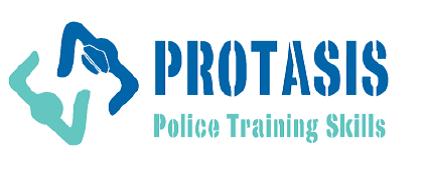The PROTASIS PROJECT
The PROTASIS Project – Police Training Skills

The PROTASIS Project was Co-funded by the Rights, Equality and Citizenship Programme of the European Union
The Project had a duration of 24 months, from the 1st December 2016 until the 30th November 2018.
PROTASIS is proposed in line with the Daphne strand under the Dg Justice grants. It aims to contribute to the effective, sufficient and sustainable implementation of the Victims’ Directive, strengthening the protection of and the support for victims of crime through the development and implementation of an inclusive module for capacity building and training of police officers, based on existing research and relevant European projects and exchange of good practices, and through the promotion of coherent referral systems including signposting victims to more specialist support services.
In the context of PROTASIS , EuroCrime has been responsible of the following tasks:
– Organization of Capacity Building and Training to Police Officers in Italy (Activity 3 of Workstream 2 “Capacity Building and Training Delivery”);
– Scientific Intermediate Evaluation of the training program (Activity 1 of Workstream 3 “Training evaluation and impact assessment”).
EuroCrime cooperated with all the other partners for the development of the other project’s activities.
The members of the project partnership are:
– European Public Law Organization (EPLO) Greece – Coordinator of the project;
– EuroCrime – Research, Training and Consulting SrL – Italy;
– Facultade de Direito, Universitade de Lisboa – Portugal;
– Fondazione Scuola Interregionale di Polizia locale (SIPL) – Italy;
– Associação Portuguesa de Apoio à Vítima (APAV) – Portugal;
– IARS International Institute (IARS), United Kingdom.
The Coordinator and the Co-beneficiaries will be supported in the implementation of the action by three Associate Partners:
– Dias in Action – Greece
– The Ministry of Internal Affairs – Portugal;
– The Police and Crime Commissioner for Hertfordshire, Barpenden Police Station – United Kingdom.
Training Manual
The PROTASIS training program aims to efficiently highlight and address the needs of both victims
and professionals and have a significant effect in bridging the existing gap of the uneven treatment
of victims and the implementation of the Victims’ Directive across Europe.
The Training Manual, entitled “Towards a victim-centered police response“, constitutes the final
output of the project and is the result of a compilation of knowledge and research acquired from
previous EU funded projects, interdisciplinary research and theories, the authors’ academic and
research expertise and their practical experience with the targeted population – victims of crimes
with special needs – as well as the exchange of good practices acquired during a 2-day work visit in
London. The insights on the benefits, challenges, obstacles, and the first-hand information and
experience offered by the UK police officers during the study visit were used to inform the design
and development of the materials and the pilot training for police officers.
The training program and material was piloted to more than 200 police officers in Italy, Portugal, and
Greece, who followed 20 hours of training seminars and workshops. After the completion of the
pilot trainings, a training evaluation and impact assessment was conducted by the IARS International
Institute, an independent to the training delivery partner. The scientific evaluation assessed the
training program and aimed to estimate its impact on the everyday working life of the policeofficers.
The findings and conclusions assisted in the further enhancement of the training program and material.
Drawing on interdisciplinary research and theories, this manual aspires to serve as a practical tool
towards a victim-centered approach in the training of police officers, criminal justice authorities, and
first-instance professionals by adopting a holistic perspective which combines theoretical knowledge
and practical skills.
The manual comprises six modules developed in a sequence that links each issue to the next,
progressively building the knowledge and capacity of the participants through a smooth transition
from one topic to the next, from general knowledge to specific skills. In addition, a set of Annexes
with handouts for the training delivery can be found at the end of the manual.
In particular, the PROTASIS Training Manual consists of the following six training modules:
1. The content and interpretation of the Victims’ Directive
This module introduces participants to the European framework on the protection and
support of crime victims, focuses on the roles and obligations of the police as described in
the Victims’ Directive, and highlights the relevant benefits for both victims and police
officers.
2. Understanding victimization
Key concepts of victim psychology and victimology constitute the main focus of this module.
The costs and the impact of victimization are presented, stressing the issues, problems, and
needs that victims face during their interaction with the criminal justice system. It further
looks into the link between secondary victimization and the different perspectives that
victims and law enforcement authorities often have, as well as the framework of the victim-
witness interviewing.
3. Gender- and child-specific issues
This module examines gender specific and child specific issues in relation to victims of
crimes. With an emphasis on domestic and sexual violence affecting women and children,
the module seeks to untangle the topic’s complex dynamic involving the psychological
responses to violence, the victims’ needs, vulnerabilities in victimization, increased risk
factors, and reasons for non-disclosing and non-reporting victimization.
4. Interaction with victims and communication skills
Drawing interdisciplinary information from various disciplines and good practices, the
central elements of this module include basic principles, practical techniques and tools for
effective communication and interaction with vulnerable victims. The setting of an initial
contact with a victim, building rapport, posing questions, and active observation and
listening to the victims’ narrative of events, are some of the topics covered using practical
examples and experiential exercises.
5. Individual assessment of victims’ needs
The content of this module covers the application of Victims’ Directive article on individual
assessment (Article 22), by providing the participants with practical tools and skills for
effectively assessing the victims’ needs during their first contact with the victim.
6. Signposting and Referral Pathways
During this module participants are presented with information on available support
services and effective techniques for safe referral. With the view of encouraging the
development of referral pathways, networking and cross-sectoral cooperation with
representatives from victim support organizations is an integral part of this module.
Download the Training Manual PDF
Here it is possibile to find more information about the Project and to keep informed about its activities:
Website: https://www.protasisproject.eu/
Facebook: httpss://www.facebook.com/ProtasisProject/
Twitter: httpss://twitter.com/ProtasisProject.

The PROTASIS Project was Co-funded by the Rights, Equality and Citizenship Programme of the European Union
Grant Agreement JUST/2015/RDAP/AG/VICT/9318
The content of this web represents the views of the author and is his/her sole responsibility. The European Commission does not accept any responsibility for use that may be made of the information it contains.

